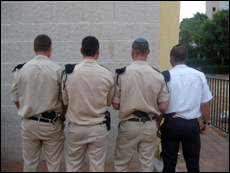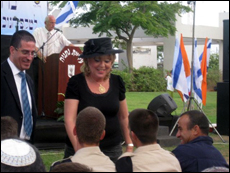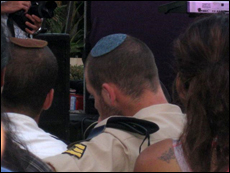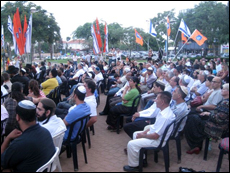 Naval commandos who stormed the Gaza bound flotilla, who are not allowed to be identified in photos. Photo by Rhonda Spivak.
|
Rhonda Spivak is an attorney, writer, and member of Canadian & Israel Bar Associations, now edits Winnipeg Jewish Review at http://www.winnipegjewishreview.com/
Netanya, Israel
I never expected to meet several of the Israeli naval commandos who stormed the Gaza flotilla, the “Mavi Marmara”, an event that has consumed the world’s attention since the day it occurred on May 31, 2010.
It just so happened that my neighbor here, Orli Avior, the only Israeli to have served in the U.S. army in Afghanistan, happened to invite me to the inauguration ceremony of a new neighborhood synagogue in Ramat Poleg, a nearby suburb of Netanya.
The synagogue, built by Avior’s friend, Nissim Sharify in honour of his mother, had decided to honour the Israeli soldiers from the flotilla unit as part of the outdoor inauguration ceremony, which was attended by the Mayor of Netanya, Miriam Fierberg, several Rabbis, and a crowd of several hundred people.
To be clear, it is not at all usual for the soldiers who stormed the flotilla to be attending public events-in fact, quite the opposite- it is a rarity. I gathered that they had not attended a public event like this before. They attended with the permission of the Israeli Defence Forces because Sharify himself had been a medic in that very same unit of the navy when he was in the army.
There they stood-a handful of them wearing the navy’s insignia on their uniforms. They were young, some with kippot, some without, some with beards, some without, some blue eyed, some brown eyed, some Ashkenazi, some Sephardi. The ones in white shirts and black pants [ as opposed to tan shirts and tan pants] were more senior, having served in the navy for more than three years. They could have looked like any Israeli soldier-young men thrust into the eye of the storm, whose every action or inaction will be deliberated by Israel’s Turkel commission, and the U.N.’s International Review Panel. If mistakes were or weren’t made in planning the operation, or at the political or diplomatic level, they really weren’t responsible. They are the small fry.
They were also the lucky ones from their unit, since several of their piers were injured by the “peace activists” who were beating them with clubs on the flotilla.
I asked how those injured in their unit were, and was told by a senior soldier that those Israelis injured had thankfully recovered.
Will these young men I met have to testify before any investigative commission? I was told by one of them that this would not be the case. In fact, Israel just announced that it will co-operate with the U.N.’s flotilla probe, and will appoint an Israeli representative to the panel. According to Prime Minister Netanyahu’s bureau, the establishment of the Turkel Commission had been necessary to prevent a situation in which a UN panel would question Israeli Defense Forces, including the young men standing before me.
Israel’s agreement to participate in a UN panel investigating IDF actions is a precedent and was made after Netanyahu came under a significant amount of international and domestic pressure. This will be the first time an Israeli representative will take part in a UN panel whose focus is Israel.
While the commissions of inquiry get under way, the task of these soldiers now is not to agonize or deliberate over every moment of what happened that day. They have to continue in their training. As one of them said, they must concentrate on new tasks.
I, of course, asked if I could I interview them, knowing that the answer would be in the negative. When I asked if I could photograph them they called over the senior of the group. Army policy is that they can’t be identified, which I knew. The young slender bearded soldier thought for a moment. He smiled. Yes I could-as long as I didn’t photograph their ‘fronts.” He laughed when I said, “ O.K., I‘ll photograph you from behind.” He gathered the junior men and smiling they turned their backs to me, and lined up outside of the men’s section of the synagogue, as I took the photo. Although I do not have a photo of their faces-I think I will remember them nonetheless. One of them asked where I was from and told me he had a friend originally from Winnipeg.
During the ceremony, these flotilla commandos sat in the front row. Some members of the audience came up to shake their hands. The crowd clapped when they were introduced. Netanya’s Mayor spoke favourably of them, saying their intention when they landed on the flotilla “was not to hurt anyone”, that they “acted morally”, that the Gaza flotilla “was a deliberate provocation”, that those on board the ship “planned to attack” them. She ended her remarks by noting that her husband when he served had been in the navy and wished these young soldiers a “Yasher Koach.”
When Nissim Sharify spoke he echoed similar sentiments. “You acted in accordance with international law,” he said to the soldiers, to applause. “No army is more moral than ours,” he continued. The United States isn’t one to point fingers at Israel, in light of its actions in Afghanistan, especially in the aftermath of all of the leaked documents about that war. “You fought against terrorists,” he said to the soldiers.
I watched as a shofar was blown by a younger member of the crowd and one of the flotilla soldiers came up to him and the two men hugged. They shook hands.
Avior, who has witnessed war in Afghanistan first hand, came up to one of them, held out her hand and said, “Thank you for defending our country.”
At the end of the ceremony the soldiers were each presented with a book of tehilim.
It is a very small country. And the navy’s soldiers who stormed that flotilla on that fateful day are no different than anyone else who is drafted into the I.D.F in Israel. To the audience at the ceremony, any one of them could have just as easily been the boy who lived next door, a cousin, a friend, a family member. They served their country. Undoubtedly, they never expected to have become the focus of the world’s attention, nor the subject of what may seem like endless investigation.












